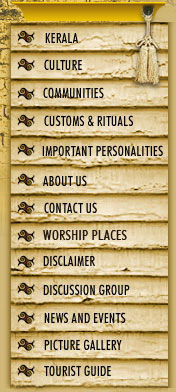|
SALIA
The Salia is derived from the word salika that means weavers. As indicate the meaning of the word, Salia is a community of weavers. They were migrants from Tamil Nadu. It is believed that they were brought to here by the Maharaja of Travancore to weave cloth to the royal family. Salaia are also known as Tamil Salia. They are settled at Balaramapuram in Thiruvananthapuram district. The Saliyan or Chaliyan is a different community of Kerala and they have no relation with Tamil Salia. Their mother tongue is Tamil. They belong to Hindu religion. They are grouped under Other Backward Class. They are non-vegetarians. Nuclear type of family is found among the Salia. Their traditional occupation is cotton weaving. They are also engaged in agriculture, trading, business etc.
They observe seemantham. They perform irupathyettukettu and naming ceremony of the newborn baby on 28th day of birth. Mundan (first tonsuring) ceremony is observed within one year. They observe puberty rite known as pushpavathy. Before marriage, they conduct a betrothal ceremony known as nichayathamboolam. Marriage is held at the bride’s residence. On the day of the marriage, the bridegroom gives bridal dress, known as muhurthapattu, to be worn by the bride at the auspicious hour. The bridegroom ties one knot of thali and his sister completes the knots. They cremate the dead. Death pollution (Pula) lasts for 16 days.
SHALIYAN
The Shaliyan are known as Chaliyans. In Ernakulam area, they are called Pattariya. They are the migrant group of people from Thanjavur of Tamil Nadu. According to legend, they are the descendants of Saint Salya. He had no children and hence he prayed God Siva for children. Siva gave him two children. They are mainly seen in Kasargode, Kannur, Kozhikode, Ernakulam and Alappuzha Districts. Though they were migrants from Tamil Nadu, now they have become Keralites and their mother tongue is Malayalam. and categorised under Other Backward Class. They are non-vegetarians. Saliyans of Malabar region have two factions – Valamkai (right hand group) and Edamkai (left hand group). They practiced marumakkathayam system till it is changed legally. Now patrilineal system is in vogue. Their traditional occupation is weaving. They are also engaged in other professions such as agriculture, business etc.
They observe pulikudy in seventh month of pregnancy. Birth pollution is observed in northern region for 11 days and it is for 16 days in southern parts. They perform irupathyettukettu on the 28th day of birth. They observe therandukalyanam. Marriage is conducted in the bride’s residence. The bridegroom ties thali around the neck of bride. They cremate the dead. Sanchayanam is held on the fifth day. Death pollution (Pula) lasts for 11 days in northern part while it is 16 days in southern area.
SAMANTHA
The Samantha claims that they are Kshathriyas without poonool (sacred thread). But it is generally supposed that they are upper class Nairs. They are seen in all over Kerala, but they are very few in number. Various sub-groups viz., Nedungadi, Eradi, Vellodi, Adiyodi, Pandala Unithiri, etc. are among them. They had sambandham relationship with Namboodithiris in the past, but now they marry within their community. Traditional joint family system (marumakkathyam) gave way to nuclear family. Once they celebrated thalikettukalyanam, which is not in vogue now. They believe in Hinduism. Generally they are vegetarians. Once they were landlords and managers of royal families. Now they are engaged in various professions in government and private services.
They observe pulikudy on the seventh month of pregnancy. Birth pollution continues for 14 days. Choroonu is celebrated in the sixth month. They perform therandukuli / therandukalyanam. Marriage is held at the bride’s residence. The bridegroom ties thali and presents pudava. They cremate their dead. Death pollution (Pula) is for 16 days. |



